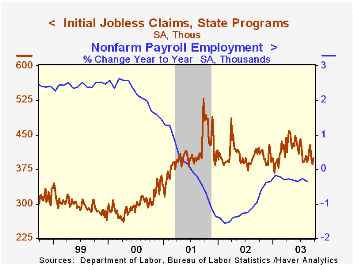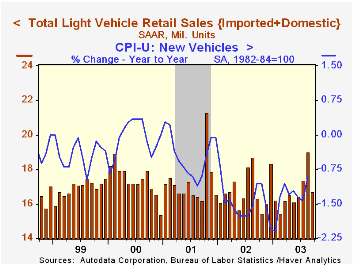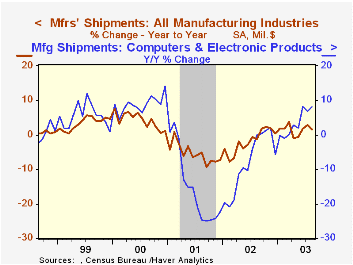 Global| Oct 02 2003
Global| Oct 02 2003Initial Jobless Insurance Claims Rose
by:Tom Moeller
|in:Economy in Brief
Summary
Initial claims for jobless insurance rose 13,000 to 399,000 last week. The gain mostly reversed a 15,000 decline the prior week which was revised shallower from the initial report. Consensus expectations had been for claims of [...]

Initial claims for jobless insurance rose 13,000 to 399,000 last week. The gain mostly reversed a 15,000 decline the prior week which was revised shallower from the initial report. Consensus expectations had been for claims of 395,000.
The four-week moving average of initial claims fell to 403,500 (-3.2% y/y). That's down roughly 10% from the recent high in early May.
Continuing claims for unemployment insurance rose a sharp 62,000 to 3,673,000. The claimant the prior week was revised down 20,000.
The insured rate of unemployment held steady at 2.9%. The rate has averaged 2.9% since April.
| Unemployment Insurance (000s) | 9/27/03 | 9/20/03 | Y/Y | 2002 | 2001 | 2000 |
|---|---|---|---|---|---|---|
| Initial Claims | 399.0 | 386.0 | -5.7% | 404.3 | 406.0 | 299.7 |
| Continuing Claims | -- | 3,673 | 1.0% | 3,575 | 3,022 | 2,114 |
by Tom Moeller October 2, 2003

Light vehicle sales fell slightly more than expected last month from the heady August selling rate. The 12.0% m/m decline to 16.72M contrasted with Consensus expectations for sales of 17.3M.
Light trucks more than reversed the August sales spike with a 14.6% m/m decline to 9.18M units.
Cars completely undid the sales gains of the prior two months with an 8.7% decline to 7.54M units.
Sales of domestic light vehicles slid 13.5% to a 13.42M unit selling rate as sales of both cars and light trucks fell.
Imported vehicle sales fell a more moderate 5.4% following the 6.3% August gain. Imports captured 19.7% of the US market in September and 19.0% in 3Q03 versus a 19.5% share last year.
The CPI for new vehicles has been deflating since early 1997.
| Light Vehicle Sales (SAAR, Mil.Units) | Sept | Aug | Y/Y | 2002 | 2001 | 2000 |
|---|---|---|---|---|---|---|
| Total | 16.72 | 19.00 | 2.4% | 16.81 | 17.26 | 17.40 |
| Autos | 7.54 | 8.26 | -4.3% | 8.07 | 8.48 | 8.83 |
| Light Trucks | 9.18 | 10.75 | 8.6% | 8.74 | 8.78 | 8.56 |
by Tom Moeller October 2, 2003

Factory orders fell a greater than expected 0.8% in August. The decline followed a 2.0% jump in July that was revised up from 1.6%.
Durable goods orders were revised to show a 1.1% m/m decline versus the 0.8% fall indicated in last week's advance report. Non-durable goods orders fell 0.5% (+5.0% y/y) following a 2.4% gain in July. (Non-durable goods orders equal shipments in this report on factory sector activity.)
The y/y strength in non-durable goods derives mostly from higher prices for petroleum products and for industrial chemicals.
Manufacturing inventories fell 0.2% in August for the fourth consecutive monthly decline. The ISM inventory index in September remained low at 42.7 suggesting further decumulation last month. Declines in inventories continued widespread.
New research from the Federal Reserve Bank of Philadelphia titled "The Role of Inventories in the Business Cycle" can be found here.
A 1.8% slide in factory shipments undid much of the prior month's gain, but lower shipments of autos & light trucks account for much of the weakness. Less the transportation sector altogether shipments fell a more moderate 0.8% (+2.9% y/y) on the heels of a 2.3% gain in July and a 1.2% gain in June. Shipments of computers & electronic products have been strong, up 8.0% y/y.
| Factory Survey (NAICS) | Aug | July | Y/Y | 2002 | 2001 | 2000 |
|---|---|---|---|---|---|---|
| Inventories | -0.2% | -0.4% | -0.7% | -1.8% | -6.1% | 3.8% |
| New Orders | -0.8% | 2.0% | 1.2% | -1.9% | -6.7% | 5.0% |
| Shipments | -1.8% | 2.6% | 1.6% | -2.0% | -5.4% | 4.2% |
| Unfilled Orders | 0.6% | -0.3% | -2.5% | -6.1% | -5.9% | 8.7% |
Tom Moeller
AuthorMore in Author Profile »Prior to joining Haver Analytics in 2000, Mr. Moeller worked as the Economist at Chancellor Capital Management from 1985 to 1999. There, he developed comprehensive economic forecasts and interpreted economic data for equity and fixed income portfolio managers. Also at Chancellor, Mr. Moeller worked as an equity analyst and was responsible for researching and rating companies in the economically sensitive automobile and housing industries for investment in Chancellor’s equity portfolio. Prior to joining Chancellor, Mr. Moeller was an Economist at Citibank from 1979 to 1984. He also analyzed pricing behavior in the metals industry for the Council on Wage and Price Stability in Washington, D.C. In 1999, Mr. Moeller received the award for most accurate forecast from the Forecasters' Club of New York. From 1990 to 1992 he was President of the New York Association for Business Economists. Mr. Moeller earned an M.B.A. in Finance from Fordham University, where he graduated in 1987. He holds a Bachelor of Arts in Economics from George Washington University.
More Economy in Brief
 Global| Feb 05 2026
Global| Feb 05 2026Charts of the Week: Balanced Policy, Resilient Data and AI Narratives
by:Andrew Cates






